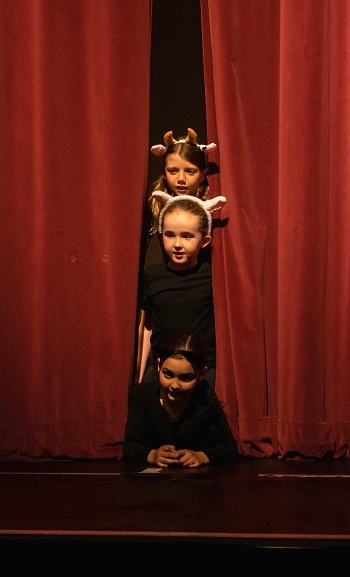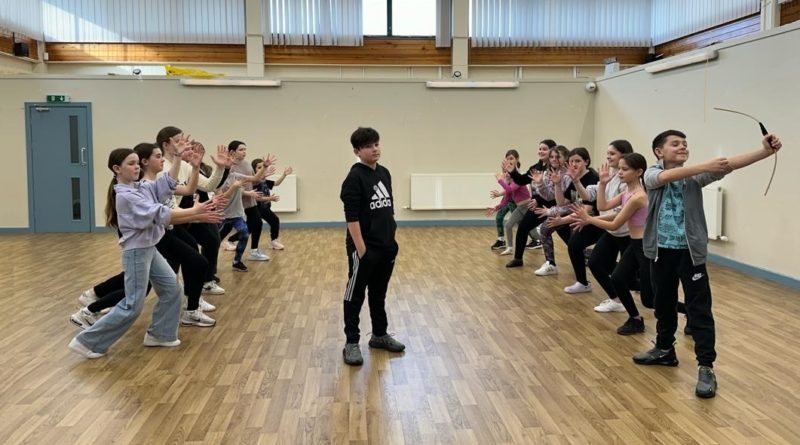You’ll thank me in the long run…
 After the usual, rather painful and stress-inducing casting process, we have just started rehearsing for our annual summer show, Robin and the Sherwood Hoodies. I’m pleased to say that this year, we have nailed it… after sending out the cast list via email, (press the send button, put on my tin hat and take up residence under the kitchen table waiting for the fallout) I am thrilled that all the children are happy, and not only that but are actively already learning lines with gusto, some of them off-book already. A miracle.
After the usual, rather painful and stress-inducing casting process, we have just started rehearsing for our annual summer show, Robin and the Sherwood Hoodies. I’m pleased to say that this year, we have nailed it… after sending out the cast list via email, (press the send button, put on my tin hat and take up residence under the kitchen table waiting for the fallout) I am thrilled that all the children are happy, and not only that but are actively already learning lines with gusto, some of them off-book already. A miracle.
In casting a children’s show, and indeed directing one, there is a very fine line between professionalism and common sense, between trying to teach and trying to please. My fear of sending out the list each time stems from mild PTSD I developed after we cast Peter Pan, in which the mother of the girl playing Wendy, a part which sixteen others auditioned for unsuccessfully, phoned me to complain because her daughter wasn’t playing Peter. Only two auditioned for that role and it went to the other one: because she was fab, and because she looked like Peter Pan.
“Well ‘X’ thought after last year’s show, it would be her turn to play the lead… I thought you would do this professionally”. That was the argument. Blimey, I thought, if the profession took turns I should be Commander and Chief of the West End by now.
It seems laughable, but at the time I was quite traumatised by the whole affair. Torn between what I knew was right for my show and the thought that we might lose a really good Noodler. We didn’t and it turned out it was mum not the girl in question who was upset. The girl was actually quite chuffed but the problem is, of course, that mum was paying the bill.
So where do we stand? We want to put on a really terrific show and we want the kids to love doing it…and that takes discipline. They are children, we can’t be tyrants; on the other hand, it takes dedication and commitment and patience to perform well. My mantra has always been: “don’t practise until you get it right, practise until you can’t get it wrong”. There’s no such thing in theatre as ‘just once more’. I remember all too well my drama school’s policy on tardiness… not signed in by 8.40am – go home. Not in class two minutes prior to the start time – get out. Harsh, but in the business if you arrive at the theatre after the ‘half’ (35 minutes before curtain up) you’ll find an understudy in your costume, psyched and ready to go, and you won’t be going on. Simples. I was terrible at punctuality as a child, I am now (almost always) early.
My attention was recently drawn to the Michaela Community School in London, which is run in almost military style, with huge clocks that inform pupils of the strict time constraints they are given to complete almost every task, from taking books out of their bags to eating lunch. It has, obviously, drawn both criticism and praise from journalists, politicians and lay observers alike, dividing opinion on how much the children actually gain from that level of discipline. Are they free thinkers with self-formed opinions on the world or simply machines, drilled to memorise and learn by rote, incapable of independent thought? Some would argue the latter, but according to the children at this school, they don’t feel there’s anything unusual about the style of teaching. They seem to relish it. I have to say, I think I learnt the most from teachers for whom I felt more than a mild intimidation.
There is safety in boundaries, we know children crave them and that a lack of them can leave kids feeling confused and adrift. We would all like to think that, as teachers, we are the fun-loving, eccentrically inspirational Robin Williams type, standing on desks shouting ‘oh Captain, my Captain’, and that as parents we are cool and exciting but able to instil morals and self-affirming life lessons in our children at the same time. There has to be a happy medium somewhere. Simply letting kids do what they want, whether it is to gain their friendship or because they should be ‘enjoying themselves’, doesn’t result in positive behaviour.
So how do you navigate extracurricular classes? We aren’t a school as such, certainly nothing is compulsory about what we do, except that we expect high standards and respect towards other performers and staff. How can you rattle on about punctuality when children are reliant on parents dropping them off, navigating the football match that finishes late and so on? We have had situations in the past when children have had to ‘sit out’ for a moment to regain their focus, and this has sometimes resulted in questions from parents. The truth is that even in a class designed to be fun, children still need to be reminded that the social boundaries apply – there’s nothing worse than a rehearsal where the wannabe performers of the future are rolling their eyes at the non-stop chatterboxes holding up the action.
Our aim is to introduce the performing arts to children, to build confidence and self-reliance, creativity and adaptability – all traits needed in later life within their professional and social futures. Whether they continue with a life in the arts or not, the discipline and standards performance training offers will stand them in good stead, wherever they go.








I enjoyed reading that candid and thoughtful post. Thank you.
The comment : ‘even in a class designed to be fun, children still need to be reminded that the social boundaries apply.’ is spot on.
as a primary teacher I loved the one year that I had a performing arts teacher working with my class. it shows a different side to the children and is great for their confidence.